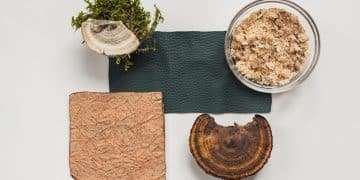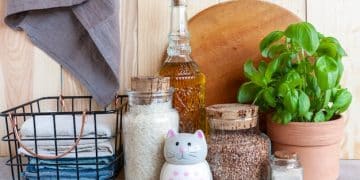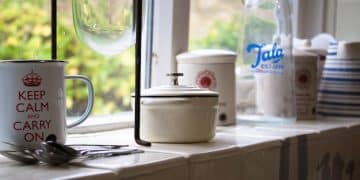Reduce Plastic Waste: 10 Simple Swaps for a Plastic-Free Life
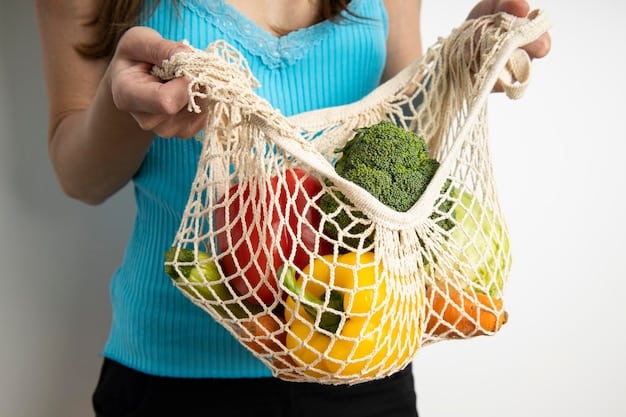
Reduce plastic waste by making simple swaps in your daily life, such as using reusable bags, water bottles, and food containers, and opting for products with minimal or no plastic packaging.
Are you looking for simple ways to **reduce plastic waste** in your daily life? It’s easier than you think to make a big difference. Let’s explore ten impactful swaps that can lead you towards a more sustainable, plastic-free existence.
Understanding the Plastic Waste Problem
Plastic waste is a significant environmental issue, impacting ecosystems and human health. By understanding the scope of the problem, you can better appreciate the importance of reducing your plastic footprint.
The Environmental Impact of Plastic
Plastic pollution affects wildlife, contaminates soil and water, and contributes to climate change. The durability of plastic means it persists in the environment for hundreds of years, accumulating over time.
- Animals often mistake plastic for food, leading to ingestion and starvation.
- Microplastics, tiny plastic particles, contaminate water sources and enter the food chain.
- The production of plastic relies on fossil fuels, contributing to greenhouse gas emissions.
The Health Consequences of Plastic Use
Chemicals in plastic can leach into food and water, posing health risks to humans. Exposure to these chemicals has been linked to various health problems.
Reducing plastic consumption not only benefits the environment but also safeguards your health and well-being. Small changes can have a significant impact, creating a healthier future for everyone.
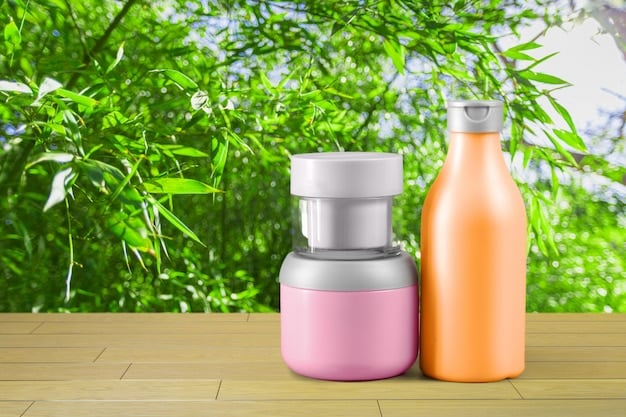
In conclusion, comprehending the plastic waste crisis underscores the urgency of adopting eco-friendly practices. By integrating simple swaps into our daily routines, we can collectively diminish our reliance on single-use plastics and foster a more sustainable world for generations to come.
Swap Plastic Bags for Reusable Shopping Bags
One of the easiest swaps you can make is switching from plastic shopping bags to reusable ones. Keep a stash in your car, by the door, or in your bag so you always have them on hand.
Choosing the Right Reusable Bags
Opt for durable, washable bags made from materials like cotton, hemp, or recycled plastic. Ensure they are sturdy enough to carry heavy items without tearing.
- Cloth bags are lightweight and easy to fold, making them convenient to carry.
- Canvas bags are strong and can handle heavier loads.
- Recycled plastic bags are a sustainable option, giving new life to existing materials.
Beyond Grocery Shopping
Use reusable bags for all types of shopping, including clothing, books, and household items. Get creative and repurpose old t-shirts or fabric scraps into unique reusable bags ensuring nothing goes to waste while **reducing plastic waste**.
Transitioning to reusable shopping bags is a straightforward yet impactful step towards **reducing plastic waste**. By consciously opting for these eco-friendly alternatives, you contribute to the conservation of natural resources, the reduction of pollution, and the promotion of a more sustainable future for our planet.
Replace Plastic Water Bottles with Reusable Bottles
Plastic water bottles are a major source of plastic waste. Switching to a reusable water bottle is a simple yet effective way to **reduce plastic waste** while staying hydrated.
The Benefits of Reusable Water Bottles
Reusable water bottles are durable, convenient, and cost-effective. They also eliminate the need for single-use plastic bottles, which often end up in landfills or oceans.
Staying hydrated is essential for your health, and using a reusable water bottle makes it easy to drink water throughout the day. Plus, you’ll save money by not buying bottled water.
Choosing the Right Reusable Bottle
Select a bottle made from stainless steel, glass, or BPA-free plastic. Consider factors like size, weight, and ease of cleaning.
- Stainless steel bottles are durable, lightweight, and don’t leach chemicals.
- Glass bottles offer a pure taste and are easy to clean.
- BPA-free plastic bottles are a lighter and more affordable option.
Incorporating reusable water bottles into your lifestyle is a practical and eco-conscious step towards **reducing plastic waste**. By making this simple change, you contribute to a healthier planet and set an example for others to follow. Embrace the convenience and environmental benefits of reusable water bottles, and take a sip towards a more sustainable future.
Ditch Plastic Straws for Reusable Alternatives
Plastic straws are used briefly and then discarded, contributing to plastic pollution. Opting for reusable straws made from stainless steel, bamboo, or glass is a sustainable alternative.
Why Reusable Straws Matter
Plastic straws are difficult to recycle and often end up polluting waterways. Reusable straws are easy to clean and can be used repeatedly, **reducing plastic waste** and protecting marine life.
- Stainless steel straws are durable and easy to clean.
- Bamboo straws are biodegradable and add a natural touch.
- Glass straws are elegant and can be easily cleaned.
Making the Switch
Carry a reusable straw with you and politely decline plastic straws when ordering drinks at restaurants or cafes. Encourage businesses to offer reusable straws as an option.
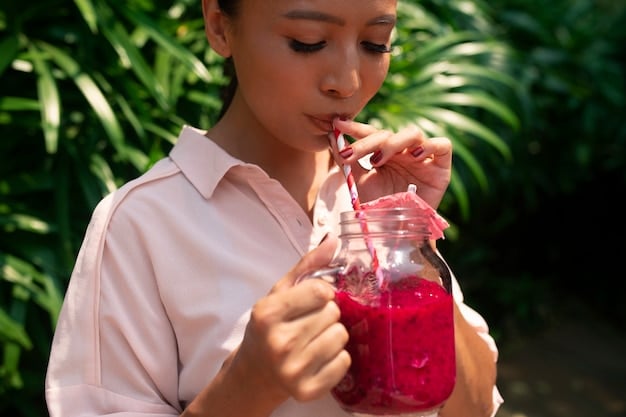
Transitioning to reusable straws is a simple yet impactful way to **reduce plastic waste** and promote sustainable habits. By adopting this small change, you contribute to the conservation of marine ecosystems, decrease plastic pollution, and inspire others to embrace eco-friendly alternatives. Embrace the convenience and environmental benefits of reusable straws, and sip your way towards a healthier planet.
Opt for Reusable Food Containers Instead of Plastic Wrap
Plastic wrap is commonly used to store leftovers and pack lunches, but it’s a single-use plastic that contributes to waste. Switching to reusable food containers is an eco-friendly alternative.
The Benefits of Reusable Food Containers
Reusable food containers are durable, versatile, and can be used for storing a variety of foods. They also help **reduce plastic waste** and keep your food fresh.
Investing in a set of high-quality reusable food containers can save you money in the long run and prevent plastic wrap from ending up in landfills.
Choosing the Right Containers
Select containers made from glass, stainless steel, or BPA-free plastic. Ensure they are airtight and leak-proof to keep your food fresh.
Utilizing reusable food containers isn’t just about environmental responsibility; it’s also about practicality and convenience. By embracing this eco-friendly alternative, you not only contribute to the reduction of plastic waste but also ensure the freshness and safety of your food. Make the switch to reusable food containers and experience the benefits of a more sustainable kitchen.
Buy in Bulk to Reduce Packaging Waste
Many products come with excessive plastic packaging. Buying in bulk can significantly **reduce plastic waste** by minimizing the amount of packaging you consume.
The Advantages of Bulk Buying
Buying in bulk reduces the amount of packaging waste you produce, often saving you money in the long run. It also allows you to purchase only what you need, reducing food waste.
- Visit bulk food stores with your own reusable containers and bags.
- Purchase essential items like rice, pasta, and nuts in bulk.
- Consider joining a local food co-op to access bulk products.
Planning Your Bulk Purchases
Before heading to the store, make a list of the items you need and the quantities you’ll use. Bring your own reusable containers and bags to avoid using plastic packaging provided by the store.
Buying in bulk is a strategic approach to **reducing plastic waste** and fostering sustainable consumption habits. By embracing this method, you not only minimize your environmental impact but also enjoy cost savings and reduced food waste. Make a conscious effort to buy in bulk whenever possible, and contribute to a more sustainable lifestyle.
Make Your Own Cleaning Products
Many commercial cleaning products come in bulky plastic bottles. Making your own cleaning products using simple ingredients like vinegar, baking soda, and essential oils can **reduce plastic waste** and save money.
Simple DIY Cleaning Recipes
Creating your own cleaning solutions is easier than you might think. Many effective recipes require just a few common household ingredients.
By making your own cleaning products, you can avoid harmful chemicals and reduce your reliance on plastic packaging. Plus, you’ll have the satisfaction of knowing exactly what goes into your cleaning supplies.
Benefits of Homemade Cleaners
DIY cleaning products are eco-friendly, non-toxic, and often more affordable than store-bought options. They also allow you to customize scents and ingredients to suit your preferences.
Creating your own cleaning products is a simple yet impactful way to **reduce plastic waste** and embrace a more sustainable lifestyle. By opting for DIY solutions, you not only minimize your environmental footprint but also ensure the safety and well-being of your household. Embrace the creativity and empowerment of homemade cleaning products, and contribute to a cleaner, greener future.
| Key Point | Brief Description |
|---|---|
| 🛍️ Reusable Bags | Switch from plastic to durable, washable reusable shopping bags. |
| 💧 Reusable Bottles | Use stainless steel, glass, or BPA-free water bottles to stay hydrated. |
| 🍽️ Reusable Containers | Replace plastic wrap with glass or stainless steel food containers. |
| 🧹 DIY Cleaners | Make cleaning products with vinegar, baking soda, and essential oils. |
FAQ
▼
Reducing plastic waste is crucial because plastic pollution harms wildlife, contaminates ecosystems, and contributes to climate change. Plastic takes hundreds of years to degrade, accumulating in landfills and oceans, causing long-term environmental damage.
▼
Easy ways include using reusable shopping bags, water bottles, and food containers. Also, buy in bulk to reduce packaging waste, make your own cleaning products, and avoid single-use plastics like straws and plastic wrap.
▼
Support businesses that prioritize sustainability and eco-friendly practices. Politely request alternatives to plastic packaging and utensils, and provide feedback to businesses about their plastic use, encouraging them to adopt sustainable solutions.
▼
For reusable products, opt for durable materials like stainless steel, glass, bamboo, and BPA-free plastic. These materials are long-lasting, safe for food and beverages, and environmentally friendly, reducing the need for single-use plastics.
▼
Biodegradable plastics can be better than traditional plastics, but they still require specific conditions to break down properly. Composting facilities are needed, and they might not always be available. Reducing overall plastic use is still the best approach.
Conclusion
By incorporating these ten simple swaps into your daily life, you can significantly **reduce plastic waste** and contribute to a more sustainable future. Each small change adds up, creating a positive impact on the environment and inspiring others to join the movement towards a plastic-free life.
